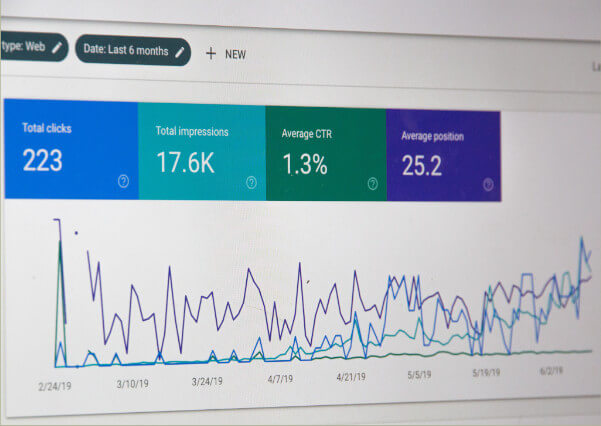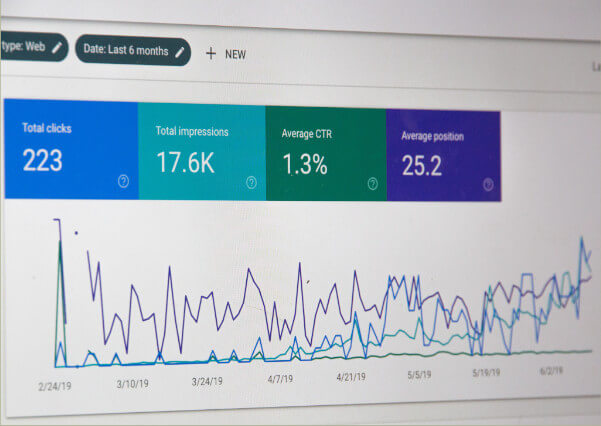
The A in E-A-T: What does authoritativeness mean and how can you demonstrate yours?
The quality of your content is so important nowadays. By creating high-quality content you can improve your rankings, attract new people and build a strong relationship with the audience you already have. If you can show authority on a topic, this lends more strength to your high-quality content and lets users know they can trust you as a source. But what does that mean? And how can you demonstrate authoritativeness in your content? We’ll tell you all about it in this post.
This post is the second in a three-part series on E-A-T. In the previous one, we discussed the E in E-A-T: What is expertise, why does it matter and how can you showcase yours?
What does authoritativeness mean?
Before we go into the impact that authoritativeness can have on the quality of your content, let’s find out what it means. Merriam-Webster gives the following definition of authoritative:
having, marked by, or proceeding from authoritypossessing recognized or evident authority: clearly accurate or knowledgeable
An authority can also be defined as a person or organization having power or control in a particular sphere. Authoritativeness is the quality of possessing authority. Meaning the level of power, control and/or knowledge someone (or something has). Someone or something that has authority on a topic is often considered highly reliable. It’s someone you can trust to have the proper knowledge.
Why authoritativeness matters
Authoritativeness is part of the concept E-A-T: Expertise, Authoritativeness and Trustworthiness. E-A-T is mentioned a lot in Google’s Search Quality Raters guidelines as one of the signals that Google uses to evaluate content.
Now, it’s important to note that E-A-T is not a ranking factor. You should consider it more of a check for Google to make sure they’re showing their users the right (accurate and trustworthy) results. However, working on E-A-T will improve the expertise, authoritativeness and trustworthiness of your content in the eyes of your audience. And that stuff matters: making sure your content is high-quality and that you’re offering people the best result out there. Having authority in your field shows that you’re a reliable source that can provide their users with valuable information. And that is something that Google loves.

How authoritativeness is determined
Not every site or source is authoritative, and that’s totally fine! Of course, if you do have authority to show, that’s a good thing – and if you do have it, be sure to show it. Still, most websites don’t have authority on the topics they write about, and that’s not necessarily a problem. E-A-T is only a major concern for YMYL pages, so if your content is truly ‘just for fun’ and doesn’t pose any risk, then it’s not a must-have.
And even if you do have YMYL content, if you can show expertise or trustworthiness in your content instead, that’s good enough. You don’t necessarily need to excel at all three. A page that has high-quality main content (with no red flags raised) only really needs to fulfil one of the three to achieve a good E-A-T rating. High expertise, authoritativeness or trustworthiness. That being said, if you can ace all three, go for it! It will benefit the quality of your pages and both Google and users will thank you for it.
Who’s the authority on this specific topic?
Google wants to show their users the best possible result for their search query. And one of the questions it asks to determine that is: who is the best source when it comes to more information on this topic? The answer to this question is partially determined by the level of authority that each eligible page demonstrates. Official websites usually have a higher chance to be the top result for queries that are related to that entity. For example, government information should be retrieved from a government site. And the best source for wheelchair-friendly areas in Yellowstone park would be the official National Park Service website.
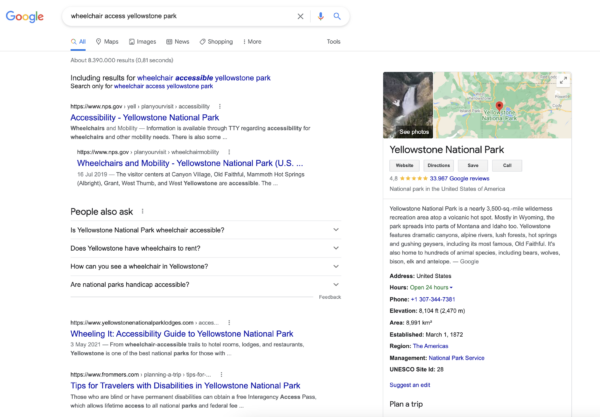
But official websites aren’t the only way to show your authority on a topic — things like qualifications and being associated with well-respected organizations count, too. For instance, Investopedia make it really transparent who the experts are behind their content. You can see in the image below that their content reviewer, Ebony Howard, is a certified public accountant and QuickBooks ProAdvisor tax expert with over 13 years of experience. By sharing this kind of information consistently, across all of their contributors and pages, Investopedia create an even stronger impression of their overall authority on financial topics.
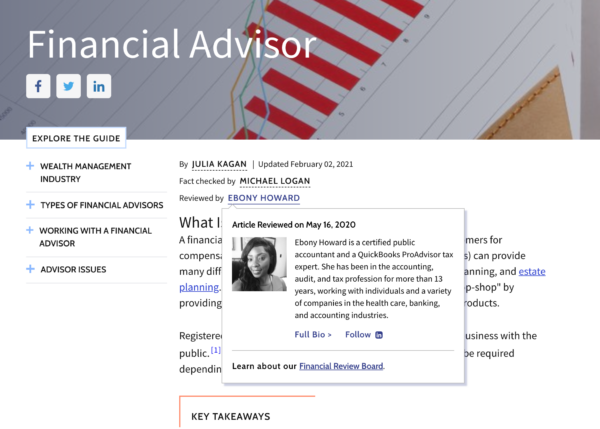
Reputation matters for authoritativeness
When Google is evaluating E-A-T, they check what other (impartial) sources say about you or your website. In the search raters’ guidelines they often refer to Wikipedia as a source. For instance, if you or your site are referred to as an authoritative/primary source for certain information on Wikipedia, that can count for a lot. e.g. Meanwhile, if other impartial sources suggest that your site provides unreliable information, even the information you provide about yourself or your own products will be taken as having lower authority.
Can you improve your authoritativeness?
Of course, we’re not all well known organizations or artists just yet. And the people you’re trying to reach might not be typing in your brand name or products in Google. That doesn’t mean that you won’t be considered as the best source of information. Sources that consistently provide high-quality information on a topic, can become an authority on that specific topic. But it’s not easy, and it won’t happen overnight.
How to build and demonstrate your authority
Becoming an authority in your field will build the trust that people and Google have in you. It takes some time, but it can increase your sales and online visibility. Using Google’s guidelines we have some tips you can use to a) build your authoritativeness and b) demonstrate the authority of your website.
Build authority with lots of original, high quality pages on a particular topic
The first tip we can give you might be an obvious one. To become (and remain) an authority in your field, you need to produce a lot of high-quality content. The more quality content you create and share with your audience, the more your audience will come to you when they want to know more about this topic. This creates a very strong relationship with your audience. A relationship that’s based on them viewing you as a credible and knowledgeable source. Which will not go unnoticed by Google.
If you’re putting in the effort to build your authority with original content, you need to make sure you’re getting credit for it! Unfortunately, some people do steal others’ content and try to pass it off as their own. So make sure your effort is benefiting your reputation, and not someone else’s! An easy solution to this is timestamping your content. A timestamp gives provides undeniable proof that this content exists, when it first appeared, who wrote it, and when it was last edited. By timestamping your content, you can prove that you are the owner of this content.
Demonstrate authority by getting others to refer to you
Having external websites link to your pages is beneficial for SEO. However, it does matter exactly who is referring to you, and what they’re saying when they do. Of course, you can’t influence every link to your website. And you don’t need to. But you can invest some time into asking your business relationships to refer to you as an authority in your field (if you are one). Where this is possible, ask relevant organizations to mention you on their website. Read more on link building from a holistic perspective.
A Wikipedia page can be really helpful for demonstrating authority, too. Not every organization has a Wikipedia page, and not every organization should. But if your organization is notable enough, yours could. So consider investing some time into getting your own Wikipedia page — but whatever you do, don’t write it yourself! Although you can request a Wikipedia page yourself, Wikipedia much prefers content that is written by independent editors. If your request has promise, a member of the WikiProject may start an article based on the sources you provide. You can read more on how do approach this on Wikipedia’s FAQ/Organizations page.
Demonstrate authority with official affiliations
Vice versa, it can be really good to showcase any relationships you have with official organizations. If you work closely with a government body, mention this on your website, and link to theirs. You can even place their logo on your website, after checking if they’re okay with that. The same goes for other official organizations that you work with. Make it obvious that you work together and what your relationship is exactly. This will improve your authority and the trust that people have in your company. But, this is something you should only do when you are actually associated with these organizations. Don’t just place someone’s logo on your page if you don’t work with them. In addition, don’t lie about the relationship you have with them. This can seriously backfire and damage your reputation.
Bonus tip: Schema can help with authoritativeness too
By using Schema you’re making it easier for Google to understand the content on your pages, and who is standing behind that content. And the easier it is for Google to understand your pages, the easier it is to determine the quality of your pages and to show your pages in the search results. Read more it in our ultimate guide to Schema and find out what benefits Schema has.
In short, Schema tells Google what your page is about and allows Google to show your content in a notable way. For example, adding the right Schema to your website can get you a knowledge panel in Google. This is the block you’ll find on the right side of your screen in the search results.
If you want to add Schema to your pages, the Yoast SEO plugin can do this for you automatically. In Yoast SEO Premium 16.4 onwards, you can add more detailed author Schema outputs to your site and pages. This helps Google to understand who you are, and why people should listen to you! It lets you include data such as honorific suffixes (PhD, MD, and so on), any awards you’ve received for your work, areas of expertise and languages you speak, too.
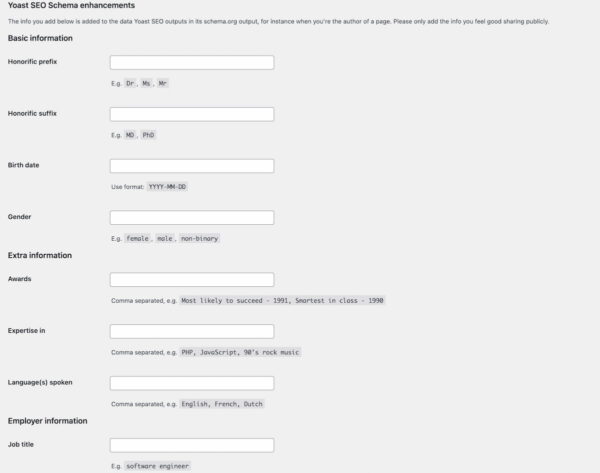
Fill in your information to output your author Schema data in Yoast SEO PremiumRead more: The E in E-A-T: What is expertise, why does it matter and how can you showcase yours? »
The post The A in E-A-T: What does authoritativeness mean and how can you demonstrate yours? appeared first on Yoast.
Did you miss our previous article…
https://searchenginesemseo.com/?p=94


